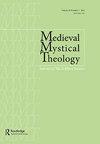Meister Eckhart and the Nearness of God (Sermon 30 Praedica Verbum )
IF 0.3
0 RELIGION
引用次数: 0
Abstract
ABSTRACTAs a preacher, Meister Eckhart knew the power of an idea and as a theologian, he grasped the mystery of the Incarnation. In exploring the nearness of God we see the preacher and theologian wrestle with the Incarnate Word, both in Christ and in us, as well. As a young theologian in Paris reading Aquinas on esse, he glimpsed the significance of divine knowing and divine existence. As a preacher, he proclaimed in various images and metaphors that sublime mystery in the human soul. It is a reality beyond our ‘thingly’ thinking and demands a new understanding of God beyond existence. Eckhart challenges our limited conceptual categories to move us from the created order to the uncreated, even beyond the existence of God. Sermon 30 offers us an opening to understand this incarnate mystery more fully as well as Eckhart’s use of language.KEYWORDS: Preachingexistenceunderstandingepistemologyincarnationdivinization Disclosure statementNo potential conflict of interest was reported by the author(s).Notes1 The MHD text reads: ‘sprich daz wort, sprich es her ûz, sprich es her vür, brinc es her vür und gebir daz wort!’ Walshe’s text renders it: ‘Speak the Word, publish it, proclaim it, bring it forth, and propagate it’ (Walshe, Meister Eckhart Sermons & Treatises, vol. 1, Sermon Eighteen, 147). Bernard McGinn translates the text: ‘Speak the word, speak it externally, speak it forth, bring it forth, give birth to the Word’ (McGinn, Meister Eckhart: Teacher and Preacher, 292)2 Walshe, Meister Eckhart Sermons & Treatises, vol. 1, Sermon 18, 147.3 While one might think Eckhart is suggesting a pantheistic understanding of God, he in fact is siding with Thomas Aquinas (Summa Theologiae I, q. 8, a 1): ‘God is in all things; not, indeed, as part of their presence, nor as an accident; but as an agent is present to that upon which it works’ (Benziger Brothers, 1947). God’s presence in all things is his acting upon created things, not as a material cause but as the proper efficient cause, in the highest part of the intelligible order. We will see that Eckhart is moving from an ontological ground of existence to an epistemological one.4 Walshe, Meister Eckhart Sermons & Treatises, Sermon 18, 147.5 Ibid., 147–8.6 Ibid., 148.7 Ibid.8 Eckhart’s ability to craft his language and engage a vast scope of ideas is one of his remarkable qualities. For a fuller appreciation of Eckhart’s linguistic strategies, I recommend Frank Tobin’s excellent work Meister Eckhart: Thought and Language (1986).9 Maurer, Meister Eckhart, Parisian Questions, 43.10 Aquinas, Summa Contra Gentiles, https://isidore.co/aquinas/english/ContraGentiles1.htm#45 (9/1/2022).11 Maurer, Meister Eckhart, Parisian Questions, 43.12 Ibid., 44.13 Ibid.14 Ibid.15 Ibid.16 Ibid., 44–5.17 Ibid., 45.18 Ibid.19 Ibid., 46.20 Ibid., 47.21 Ibid., 48.22 Eckhart’s ability to learn from Aquinas and to develop his own thought is part of Eckhart’s genius and intellectual creativity. I have found that his sense of Aquinas is masterfully explored in the 2014 work by Wendlinder, Speaking of God in Thomas Aquinas and Meister Eckhart.23 Maurer, Meister Eckhart, Parisian Questions, 50.24 Ibid.25 McGinn, Meister Eckhart: Teacher and Preacher, 293. In this case I prefer McGinn over Walshe, as closer to Eckhart’s text. see note #126 Ibid.27 In several sermons Eckhart uses the Patriarch Jacob for his recognizing the presence of God. In Sermon DW 68, Walshe, Meister Eckhart Sermons & Treatises, 69 he references Genesis 28:16 ‘God is in this place, and I knew it not’ and states: ‘We should know God and be aware that God’s kingdom is near to hand’ (Walshe, Meister Eckhart Sermons & Treatises, II, 166). Also, DW 36b, Walshe, Meister Eckhart Sermons & Treatises, 39 Eckhart tells us: ‘He says to a place’; he does not name it. The place is God. ‘God has no name of His own, and is the place and position of all things and is the natural place of all creatures’ (Walshe, Meister Eckhart Sermons & Treatises, Sermon Thirty-Nine, 278)28 Helpful works on Eckhart’s vocabulary have been: Schmoldt’s Die deutsche Begriffssprache Meister Eckharts; and Udo’s ‘Der mystische Wortschatz Meister Eckharts im Lichte der energetischen Sprachbetrachtung’.29 Cyprian Smith’s inspiring book The Way of Paradox: Spiritual Life as Taught by Meister Eckhart (1987) explores the role of paradoxical images in Eckhart and in the Christian life. It is a helpful meditation on the Meister’s teachings.30 Walshe, Meister Eckhart Sermons & Treatises, Sermon Eighteen, 147.31 Eckhart’s language is challenging and enables him to challenge our ideas about God and life itself. The engaging collection of essays edited by Steven T. Katz, Mysticism and Language (1992) offers a valuable study of mystical language and its impact on our world of meaning.32 Disem nû (DW I pr.1, p.12,2); disem gegenwertigen nû (DW I pr.2, p.26,1); dem êwigen nû (DW I pr.2, p.34,2); daz nû (DW I pr.2, p.34,3); einem gegenwertigen nû (DW I pr.10, p.166,5); and einem wesenlîchen nû (DW I pr.10, p.166,9).33 Walshe, Meister Eckhart Sermons & Treatises, Sermon 18, 148.34 Ibid.35 Colledge and McGinn, Meister Eckhart: The Essential Sermons, 266.36 Walshe, Meister Eckhart Sermons & Treatises, Sermon 13 (a), 109–10.37 Ibid., Sermon 28, 211.Additional informationNotes on contributorsMichael DemkovichVery Rev. Michael Demkovich is Vice Chair of the Eckhart Society, holding his doctorate from the Katholieke Universiteit Leuven (S.Th.D. and Ph.D.). He serves as pastor of Immaculate Conception Catholic Church in Tomè, New Mexico, and is an Episcopal Vicar for the Archdiocese of Santa Fe. He has presented papers and published various articles and books. He is presently working on a trilogy on trust.埃克哈特先生与上帝的亲近(布道30 Praedica Verbum)
166年,5);和einem wesenlchen nû (DW I pr.10, p.166,9).33Walshe, Meister Eckhart讲道与论文,讲道18,148.34同上。35 Colledge和McGinn, Meister Eckhart讲道:基本讲道,266.36 Walshe, Meister Eckhart讲道与论文,讲道13 (a), 109-10.37同上,讲道28,211。作者简介:Michael Demkovich Rev. Michael Demkovich是Eckhart Society的副主席,拥有天主教鲁汶大学(s.t.d)博士学位。和博士)。他是新墨西哥州Tomè圣母无原罪天主教堂的牧师,也是圣达菲大主教管区的圣公会牧师。他发表过论文,并出版过各种文章和书籍。他目前正在写一部关于信任的三部曲。
本文章由计算机程序翻译,如有差异,请以英文原文为准。
求助全文
约1分钟内获得全文
求助全文

 求助内容:
求助内容: 应助结果提醒方式:
应助结果提醒方式:


